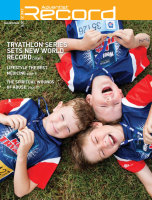One of the world’s leading health and exercise scientists describes it as one of the most exciting medical discoveries of the past few decades: the power of “low tech” for remedying problems created by “high tech”.
“Scientific evidence is showing that returning to a simple lifestyle is often the best way to manage and treat chronic disease,” says Dr Darren Morton, a senior lecturer at Avondale College of Higher Education whose doctorate is in human physiology. “It seems lifestyle is the best medicine.”
Seventh-day Adventists have known and practiced this since their beginnings as a church more than 150 years ago. So, it is fitting Adventists are continuing to make a prominent contribution to the emerging discipline of lifestyle medicine. For example, the founder of the American College of Lifestyle Medicine, Dr John Kelly, is an Adventist. As are several of the college’s presidents, including the incoming president.
Avondale, as one of three Adventist tertiary institutions in the South Pacific, is also making a contribution through its new Lifestyle Research Centre. The centre brings together academics from Avondale—Dr Morton, a lead researcher described by The Wall Street Journal as the world’s “most-published authority” on the stitch, is one—and at other entities. Their motto: “optimising health outcomes.”
“Thomas Edison once said the doctor of the future will give no medicine but interest his patients in the cause and prevention of disease,” says director Dr Brett Mitchell, an associate professor of nursing. “This is exactly what the centre’s about and why its work is so important.”
That work includes partnering with Sanitarium Health and Wellbeing to relaunch and study the Complete Health Improvement Programs (CHIP). Dr Paul Rankin used the lifestyle intervention as the basis for his PhD, which he completed through Avondale. He found the delivery of CHIP by volunteer facilitators in their communities significantly improves the health of participants. “I can now stand up when I train CHIP facilitators [Rankin is CHIP in Churches program director for the church in the South Pacific] and say, ‘We know that by running this program, you will be making a difference to people’s lives.’”
The research by Dr Rankin and others in the Lifestyle Research Centre is establishing credibility in the medical community. Published papers have appeared in academic journals such as the British Medical Journal Open, the New Zealand Medical Journal and the Medical Journal of Australia.
Research presented in the latter measured an increase in hospital-identified Clostridium difficile infections. The message: we need to standardise cleaning practices and products.
Dr Mitchell, a co-author of the paper, is a chief investigator on a National Health and Medical Research Council grant implementing and evaluating the effectiveness and the cost-effectiveness of targeted environmental cleaning practices in 20 Australian hospitals. “I’ve gone into research to make a difference,” he says. “That’s why the work of the Lifestyle Research Centre is important—our projects are sustainable, cost effective and improve lives. And because we have a range of academics working on projects, we consider a number of different perspectives.”
The centre is also growing its contribution to the church’s health message by studying the effectiveness of a modified CHIP for illiterate communities in the South Pacific and by offering postgraduate degrees in lifestyle medicine. Other areas of interest include avoidable blindness, education programs addressing non-communicable diseases, medical humanities, mental health and wellbeing and nutrition.
Giving to the Avondale Annual Appeal this year will support—by employing research assistants and providing scholarships—two of the centre’s projects. The first, Lifestyle Intervention, is improving wellbeing by reducing the burden of chronic disease. The second, Infection Prevention, is reducing the impact of preventable infections.
If the evidence is showing lifestyle is the best medicine, then the Adventist health message “is arguably more relevant today than when it was conceived,” says Dr Morton. “And that’s exciting because we have the potential to help others become healthier and happier.”
Give to the Avondale Annual Appeal at <www.avondale.edu.au/egiving>. Donations above $2 are tax deductible in Australia.






